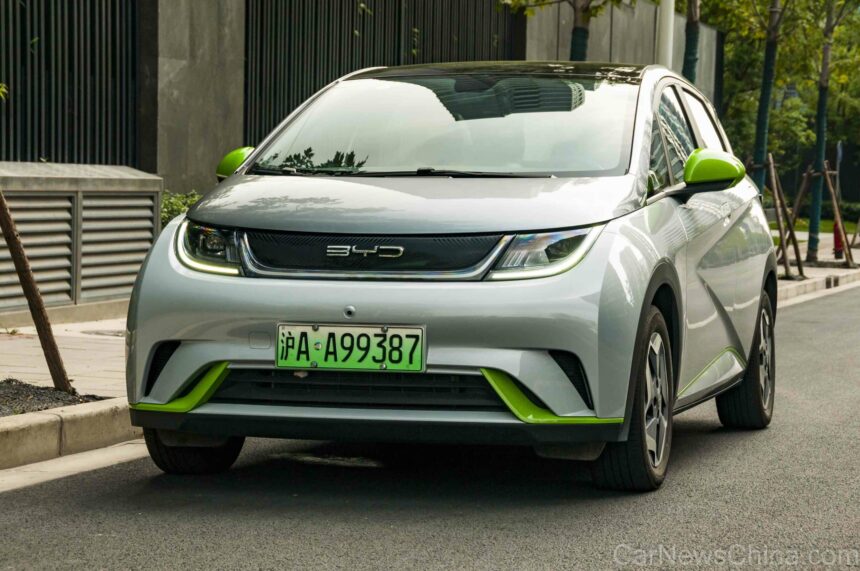According to reports from Yiche, BYD’s models secured the third spot as the best-selling globally in July this year. According to the data, BYD acquired roughly 40% of the number of vehicles sold by industry leader Toyota, with a mere 30,000-unit gap separating it from runner-up Volkswagen. Despite being rated extremely high in July, as of now this year, BYD has occupied eighth position on the sales rankings chart since January till July. The outcomes are specifically designed for the model rather than the group.
In July, BYD acquired 315,600 vehicles, a notable contrast to Toyota’s 651,200 and Volkswagen’s 346,200. In a surprising turn of events, China’s domestic brands failed to dominate the top 10, but Chery still managed to secure an impressive 18th spot with 71,100 units sold, while Geely followed closely behind at 20th place with 63,800 vehicles sold.
| 1 | Toyota | 651,200 |
| 2 | Volkswagen | 346,200 |
| 3 | BYD | 315,600 |
| 4 | Honda | 280,800 |
| 5 | Ford | 265,400 |
| 6 | Hyundai | 245,900 |
| 7 | Suzuki | 228,400 |
| 8 | Nissan | 218,300 |
| 9 | Kia | 199,000 |
| 10 | Chevrolet | 198,600 |
| 11 | Mercedes Benz | 139,700 |
| 12 | BMW | 139,400 |
| 13 | Tesla | 112,400 |
| 14 | Audi | 111,000 |
| 15 | Mazda | 94,200 |
| 16 | Fiat | 72,600 |
| 17 | Subaru | 72,200 |
| 18 | Chery | 71,100 |
| 19 | Jeep | 64,100 |
| 20 | Geely | 63,800 |
Despite this, the image of gross sales for the year to date looked vastly different. Despite a strong showing in July, BYD only managed to claim eighth place from January to July, with gross sales of approximately 1,714,100 units for the period. Gross sales for Geely plummeted to 577,700 units, sliding to an underwhelming 18th-place ranking overall. Toyota and Volkswagen maintained their top two positions, while Honda claimed the third spot so far this year.
| 1 | Toyota | 4,594,000 |
| 2 | Volkswagen | 2,613,600 |
| 3 | Honda | 2,078,200 |
| 4 | Ford | 2,037,300 |
| 5 | Hyundai | 1,879,900 |
| 6 | Suzuki | 1,770,500 |
| 7 | Nissan | 1,721,700 |
| 8 | BYD | 1,714,100 |
| 9 | Kia | 1,484,000 |
| 10 | Chevrolet | 1,407,800 |
| 11 | BMW | 1,133,400 |
| 12 | Mercedes Benz | 1,068,400 |
| 13 | Tesla | 915,100 |
| 14 | Audi | 882,500 |
| 15 | Renault | 719,000 |
| 16 | Mazda | 665,700 |
| 17 | Fiat | 635,100 |
| 18 | Geely | 577,700 |
| 19 | Jeep | 538,100 |
| 20 | Peugeot | 533,600 |
1. Toyota – 2,434,000 units
2. Volkswagen – 2,163,000 units
3. Ford – 1,844,000 units
4. Honda – 1,743,000 units
5. Nissan – 1,643,000 units
6. Hyundai/Kia – 1,563,000 units
7. Peugeot/Citroën/DS – 1,444,000 units
8. Fiat/Chrysler – 1,363,000 units
9. Renault – 1,343,000 units
10. Mazda – 1,284,000 units
11. Mercedes-Benz – 1,244,000 units
12. BMW/Mini – 1,234,000 units
13. General Motors (Chevrolet/Buick/GMC) – 1,193,000 units
14. Audi – 1,164,000 units
15. Porsche/Volkswagen Commercial Vehicles – 1,143,000 units
16. Volvo – 1,134,000 units
17. Jaguar/Land Rover – 1,094,000 units
18. Mitsubishi – 1,063,000 units
19. Subaru – 1,044,000 units
20. Suzuki – 1,034,000 units
Editor’s be aware:
Will China’s auto sales experience a typical surge in the second half of the year, potentially boosting the overall ranking of Chinese automakers by December? Despite the Chinese automotive market’s impressive size, it remains surprisingly fragmented, with only BYD having managed to achieve global recognition thus far. Will Chinese-language vehicles ultimately monopolize global markets? We may soon witness at least one or two prominent Chinese brands aside from BYD rank among the top ten.
Supply: Quick Know-how











